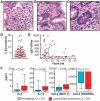TGFβ receptor mutations impose a strong predisposition for human allergic disease
- PMID: 23884466
- PMCID: PMC3905327
- DOI: 10.1126/scitranslmed.3006448
TGFβ receptor mutations impose a strong predisposition for human allergic disease
Abstract
Transforming growth factor-β (TGFβ) is a multifunctional cytokine that plays diverse roles in physiologic processes as well as human disease, including cancer, heart disease, and fibrotic disorders. In the immune system, TGFβ regulates regulatory T cell (Treg) maturation and immune homeostasis. Although genetic manipulation of the TGFβ pathway modulates immune tolerance in mouse models, the contribution of this pathway to human allergic phenotypes is not well understood. We demonstrate that patients with Loeys-Dietz syndrome (LDS), an autosomal dominant disorder caused by mutations in the genes encoding receptor subunits for TGFβ, TGFBR1 and TGFBR2, are strongly predisposed to develop allergic disease, including asthma, food allergy, eczema, allergic rhinitis, and eosinophilic gastrointestinal disease. LDS patients exhibited elevated immunoglobulin E levels, eosinophil counts, and T helper 2 (TH2) cytokines in their plasma. They had an increased frequency of CD4(+) T cells that expressed both Foxp3 and interleukin-13, but retained the ability to suppress effector T cell proliferation. TH2 cytokine-producing cells accumulated in cultures of naïve CD4(+) T cells from LDS subjects, but not controls, after stimulation with TGFβ, suggesting that LDS mutations support TH2 skewing in naïve lymphocytes in a cell-autonomous manner. The monogenic nature of LDS demonstrates that altered TGFβ signaling can predispose to allergic phenotypes in humans and underscores a prominent role for TGFβ in directing immune responses to antigens present in the environment and foods. This paradigm may be relevant to nonsyndromic presentations of allergic disease and highlights the potential therapeutic benefit of strategies that inhibit TGFβ signaling.
Figures






Comment in
-
Asthma and allergy: TGFβ--too much of a good thing?Nat Rev Immunol. 2013 Sep;13(9):618-9. doi: 10.1038/nri3519. Epub 2013 Aug 2. Nat Rev Immunol. 2013. PMID: 23907447 No abstract available.
References
-
- Markowitz JE, Spergel JM, Ruchelli E, Liacouras CA. Elemental diet is an effective treatment for eosinophilic esophagitis in children and adolescents. Am. J. Gastroenterol. 2003;98:777–782. - PubMed
-
- Spergel JM, Beausoleil JL, Mascarenhas M, Liacouras CA. The use of skin prick tests and patch tests to identify causative foods in eosinophilic esophagitis. J. Allergy Clin. Immunol. 2002;109:363–368. - PubMed
Publication types
MeSH terms
Substances
Grants and funding
LinkOut - more resources
Full Text Sources
Other Literature Sources
Medical
Research Materials

